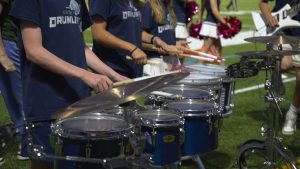Debates over costumes haunt Halloween season
Is your costume a culture?
October 27, 2017
Although the celebration of Halloween traditionally calls for outrageous costumes, there has recently been much debate about the appropriateness and the political correctness of costumes that students wear to both school and social gatherings.
The New Trier administration emphasizes, “no racially or ethnically stereotyped costumes; no masks or face paint; no sexually suggestive costumes; no real or fake weapons; no scooters, rollerblades, or roller skates,” according to an email sent to advisors by assistant superintendent Peter Tragos and assistant principal Scott Williams.
In recent years, administrators have also encouraged advisors to discuss cultural appropriation with students. In the same email, the assistant principals shared a poster campaign called “We’re a Culture Not a Costume,” created by a student organization at Ohio University.
The campaign uses a series of photos to argue that especially white Americans should not mock or generalize diverse groups of peoples with often profound or tragic histories in this country.
When adviser Dyan Marich presented the campaign to her former advisees one year, not all of them understood or agreed. “I was kind of surprised, and I tried to get [them] to make sense of it [by explaining] ‘I don’t have an answer for you, but sometimes something does not feel right and makes [you] uncomfortable,’” said Marich.
Students largely seem to agree that costumes that refer to peoples of a race or religious group are often offensive, and should be avoided.
“If you’re putting on blackface, you know that what you’re doing is offensive and wrong. You know what [black] people have gone through. Blackface is not funny,” argued sophomore Emily Rhee.
However, as many students suggested, people have varying opinions on what constitutes cultural appropriation and what does not. “It’s not something that is always very easy to talk about,” said senior Mateo Blair.
Senior Peter Leutz expressed the need for open dialogue on these matters. “If a person were to wear a costume that were appropriating a culture, I hope that people would speak up and educate that person. Then that person could say, ‘You’re right. I didn’t think about that,’ or ‘Next year, or even at turnabout, I will be more educated,’” said Leutz.
Some students also suggested that costumes mocking political figures may offend especially students with strong opinions.
“If you’re putting yourself out as a public figure, you have to expect that kind of stuff. But with Indians or black face, black people are not a meme or a public figure,” countered senior Clara Jungwirth.
Sexually suggestive rather than culturally appropriative or politically motivated costumes seem to appear more frequently among specifically female students.
“Almost all women wear ‘slutty’ costumes, so there kind of is an expectation that they do that. But at the end of the day, that is a woman’s own choice,” said Blair.
Costumes can also offend especially those whose professions or beliefs are being sexually caricatured. “I’ve seen a lack of clothing with a lot of costumes, like nurses, cops, and even nuns,” said Jungwirth.
Ultimately, students and faculty seem to agree that anyone who dresses up on Halloween should consider the message that a costume may send.
As Williams said, “We are blessed with a lot of students who have very good judgment and can take that second and pause. It’s a matter of taking that second and pausing and saying, ‘Number one, could somebody be offended by this? Then, will this be appropriate for school?’”
Leutz expressed hope that Halloween could above all else remain a holiday when all students feel free to dress up and have fun.
“I hope that people don’t lose the excitement and fun of dressing up for Halloween because they’re afraid of offending someone. But I also hope that if you dress up in something that could offend someone else, you are ready to own that.”











































